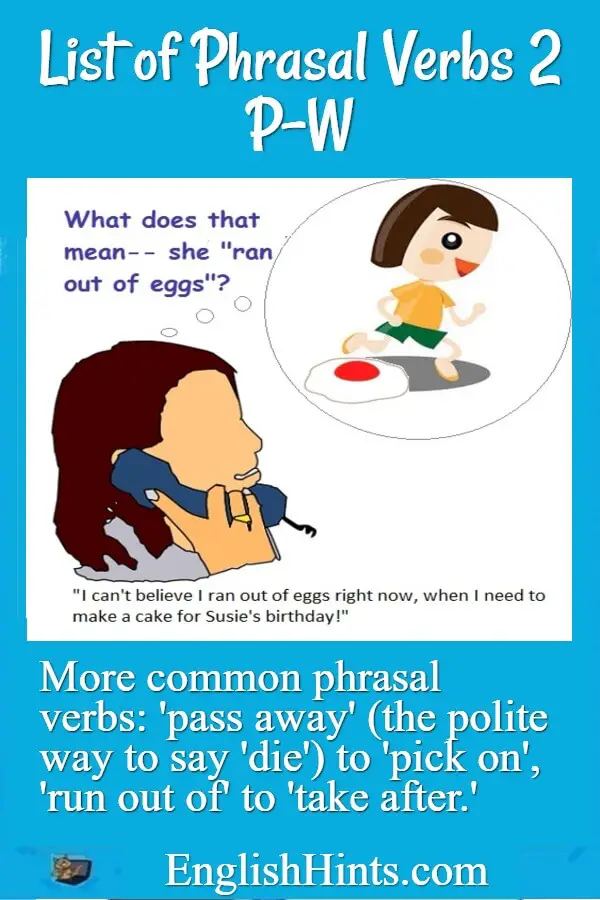List of Phrasal Verbs 2: P-W
This list of phrasal verbs from P-W follows English Phrasal Verbs A-M. English speakers use these 2 or 3-word verbs constantly in informal conversations and even in business discussions. See how many you can guess-- and learn the rest!
List of Phrasal Verbs: P
• To pass away is to die. (It’s a “gentler” way to say it.)
• To pass out is to give (hand) out something (usually papers) or (2nd meaning) to faint. (“I have a friend that passes out if she stands in the sun too long.”)
• To pick on means to criticize or find fault with someone. It can sometimes involve bullying or minor physical abuse. Famous advice for bullies: “Why don’t you pick on someone your own size?”)
• To pick out means to choose or select one item from several. (“Have you picked out your prom dress yet?”)
• To pick up is to lift something off the floor, or to put things back in their proper locations. (A mother tells her child to “pick up your toys!”) It can also mean to buy something. ("Please pick up some milk and eggs at the store on your way.") It does not mean to choose or to pull fruit or flowers off plants-- the two most common meanings for 'pick.'
• To put away means to put things where they belong. (“Put the groceries away as soon as you get home. Meats and vegetables go in the refrigerator and cereal goes in the cupboard. Cleaning supplies go under the sink.”)
• To put off is to postpone-- to wait until later to do something. (“Don’t put off doing your homework any longer!”)
• To put on clothing means to get dressed. (To remove clothing is to take it off, not put it off.)
• To put something together is to assemble it (to connect all its parts.)
• To put up with means to tolerate an uncomfortable or annoying situation.
List of Phrasal Verbs: R-S
• To run into is to see someone familiar in an unexpected place. It doesn’t usually involve a physical collision, although it can. (“Guess who I ran into at church? I didn’t even know Sheila was back in town!”)
• To run out of means to use the last of something and need more. (“I can’t believe I ran out of sugar in the middle of making Christmas cookies!”) To run out of steam is to have no energy left. See also ‘use up.'
• To show up is to arrive at a gathering. “Julia finally showed up— late, as usual.”
• To stand out is to be prominent, noticeable, or outstanding.
Phrasal Verbs with Take
• To take after is to resemble a parent or other relative in character or behavior. (“Johnny takes after his grandpa: just as stubborn and hard-nosed!”)
• To take apart is to separate or disassemble something. (“Joe took the clock apart, but he couldn’t put the pieces together again.”)
• To take away can mean to subtract one number from another. It can also mean to remove something from a place or take something from a person. A "take away" is something you have learned or gained from an experience.
• To take back is to return something, or sometimes to withdraw or change a comment. (“I take back what I said about your driving. You handled that traffic today really well, without letting it get ‘under your skin.’”)
• To take in someone usually means to deceive him (or her). It can also mean to bring someone into one's home and take care of (care for) him or her-- or bring in an animal. "Jenny is so soft-hearted she is always taking in stray dogs."
• To take off can mean to remove clothing. (“He took off his jacket.”) It can also refer to a plane leaving the ground (“Fasten your seatbelts to prepare for takeoff.”)
• To take on a project is to make a commitment that you will do it.
• To take out is to carry something outside: take food home from a restaurant or take the trash out to throw it away. It can also be used to take a person out, for example, to a restaurant or on a date.
• To take over something is to take control of it. After World War 2 the Soviet Union took over much of eastern Europe. When a company takes over a business it becomes part of it.
List of Phrasal Verbs: Tell-W
To tell apart is to recognize the difference between similar things or people. (“I can’t tell those twins apart. Which one is Sue?”)
• To think about is the most common expression for whatever is on our minds. ("Are you still thinking about the test you took yesterday?") In modern English we say 'think about', NOT 'think on' a subject.
• To think of something is to bring it to mind-- to have a new idea or remember something you already knew. ("Oh! I just thought of a better way to do that!" Or: "I thought of a better way to make those cookies.")
• To think over is to consider an idea-- usually more carefully than just to think about it. (“That’s our offer. Think it over and call us Monday.”)
• To think up something is to come up with a new idea. It's similar to 'think of,' but less common except when planning some kind of joke, plot, or scheme
• To throw away (or throw out) is to dispose of something worthless, usually by putting it into a trash container.
• To try on clothing means to put it on before buying it to see if it fits.
• To turn down means to reduce the volume or temperature setting on an electronic device. (“Turn down the TV!”) It can also mean to politely refuse an invitation. (“I’d love to go to the party with you, but I promised I would babysit, so I’ll have to turn you down this time.”)
• To turn off is to move a switch or lever to stop the flow of water, electricity, or gas. (“Turn off the stove as soon as you finish cooking!” “Turn off unused lights to reduce your electricity bill.”) 'Turn off' can also be used to describe something that disgusts a person. (“When he acts so superior, it turns me off!”)
• To turn on is to move a switch or lever to start the flow of water, electricity, or gas. (It can also be used to describe something or someone that causes sexual excitement: “You really turn me on!” This is a slang expression and could be offensive.)
• To turn out (often) means the way a story finishes. (“So what happened to Julie? Did the romance turn out OK in the end?”) 'Turn out' can also be used for turn off— to turn out the lights (and make the room dark), for example.
• To turn up can mean to increase the volume or temperature setting (see turn down.) It can also mean to appear unexpectedly. (“Joe turns up at any party where there is free food!” See ‘show up’-- they can be used the same way.)
• To use up means to finish or exhaust the supply of something. (“I can’t make a cake. Mary used up all the eggs!” See ‘run out of.’)
• To wake up means to return from sleep to full consciousness.
• To watch out is to be careful (to look out.) (“Watch out for that car behind you!”)
The List of Idioms can help you understand what people mean when they say they can barely “make ends meet”, tell you to meet them at 3:00 P.M. “on the dot”, or say they want to get together “one of these days.” (Hint: don't wait for it.)
These 2-3 word phrasal verbs are used much more commonly in conversation that the formal verbs with the same meaning. This page gives the meanings of phrasal verbs from back out to make up.
Two phone and two in-person conversations demonstrate common phrasal verb & idiom examples.
Home> Common Idioms > List of Phrasal Verbs P-W.
Didn't find what you
needed? Explain what you want in the search box below.
(For example, cognates, past tense practice, or 'get along with.') Click to see the related pages on EnglishHints.
| site search by freefind | advanced |









